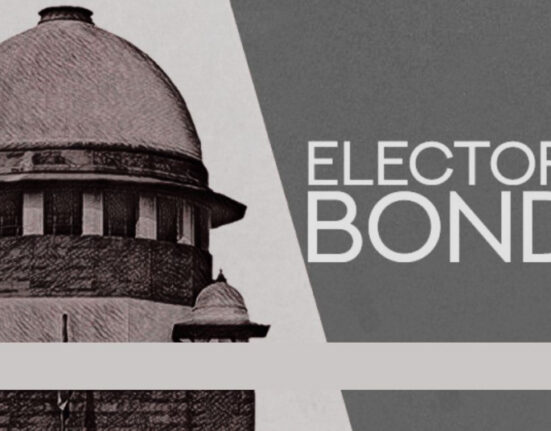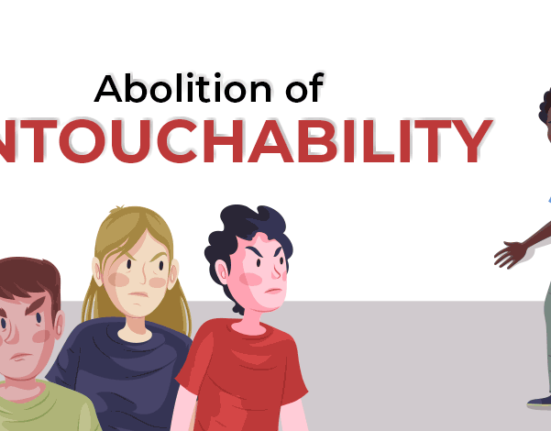Introduction: Bare Provision of Article 15 Indian Constitution
The Indian Constitution Article 15 talks about the Prohibition of discrimination on grounds of religion, race, caste, sex or place of birth. It says below-mentioned points.
- The State shall not discriminate against any citizen on grounds only of religion, race, caste, sex, place of birth or any of them.
- No citizen shall, on grounds only of religion, race, caste, sex, place of birth or any of them, be subject to any disability, liability, restriction or condition with regard to—
- access to shops, public restaurants, hotels and places of public entertainment; or
- the use of wells, tanks, bathing ghats, roads and places of public resort maintained wholly or partly out of State funds or dedicated to the use of the general public.
- Nothing in this article shall prevent the State from making any special provision for women and children.
- Nothing in this article or in clause (2) of Article 29 shall prevent the State from making any special provision for the advancement of any socially and educationally backward classes of citizens or for the Scheduled Castes and the Scheduled Tribes.
- Nothing in this article or in sub-clause (g) of clause (1) of article 19 shall prevent the State from making any special provision, by law, for the advancement of any socially and educationally backward classes of citizens or for the Scheduled Castes or the Scheduled Tribes in so far as such special provisions relate to their admission to educational institutions including private educational institutions, whether aided or unaided by the State, other than the minority educational institutions referred to in clause (1) of article 30.
Explanation of Article 15 of Constitution of India
Article 15 of Indian Constitution provides for a particular application of the general principle embodied under Article 14. The guarantee under Article 15 is available to citizens only. The state cannot discriminate only on the above mentioned grounds but can discriminate on grounds other than these. The rights under 15 (2) are not only available against a State but also against other citizens.
Article 15 (1) states that no citizen shall be discriminated only on the grounds of religion, race, caste, sex, place of birth or any of them. But there are special considerations for women and children, SC/ST, OBC. Exceptions for these categories are mentioned in Clause (2) and (3) of Article 15. Article 15 (2) is a specific application of the general prohibition contained in Article 15 (1).
While Clause (1) prohibits discrimination by the State; clause (2) prohibits both the State and private individuals from making any discrimination.
Women and children require special treatment on account of their very nature and therefore Article 15 (3) empowers the State to make special provisions for women and children. The reason is that “women’s physical structure and the performance of maternal functions place her at a disadvantage in the struggle for subsistence and her physical well-being. Thus, under Article 42, women workers can be given special maternity relief and a law to this effect will not infringe Article 15 (1). Also, if an educational institution is established by the State exclusively for women or if reservation of seats is made for women in a college, it does not offend Article 15 (1).
Article 15 Clause (4) is another exception to clause (1) and (2) of Article 15. Article 15(4) has been inserted by the constitution ( first amendment ) Act, 1951. It was added by the Constitution (1st Amendment) Act, 1951, as a result of the decision in State of Madras v. Champakam Dorairajan[AIR 1951 SC 226]. The provision made in clause (4) is only an enabling provision and does not impose any obligation on the State to take any special action under it. It merely confers discretion to act if necessary by way of making special provision for backward classes. A writ cannot be issued to the State to make reservation. The basic principle underlying this clause is that a preferential treatment can be given validly where socially and educationally backward classes need it.
Thus under Article 15 (4), two things are to be determined-
- Who are socially and educationally backward classes?
- What is the limit of reservation?
Constitution nowhere defines ‘backward classes’. Article 340, however, empowers the President to appoint a Commission to investigate conditions of socially and educationally backward classes. On the basis of the report of the Commission the president may specify who are to be considered as ‘Backward classes’. In Balaji v. State of Mysore [AIR 1963 SC 649], it was held that ‘backward’ and ‘more backward’ classification is not bad.
In the historic Mandal Commission Case [Indira Sawhney v. Union of India, AIR 2000 SC 498], the Supreme Court by 6-3 majority has held that the sub-classification of backward classes into backward into more backward and backward classes for the purpose of Article 16(4) can be done. But as result of sub-classification, the reservation cannot exceed more than 50 percent. Creamy layer must be excluded from the backward classes.
High caste girl marrying a male of Scheduled tribe is not entitled to reservation benefit under Clause (4) of Article 15. Also, a Scheduled Caste or a Scheduled Tribe candidate is entitled to reservation benefit only in the State of his origin and not in other State where he migrates to.
Article 15 clause (5)– In order to serve the educationally and socially backward classes, the State asked the private education institutions also to reserve seats for the backward classes. Private institutions objected to it, stating it would amount to violation of right under Article 19 (1) (g). The Parliament, by amending the Constitution in 2005, added Clause (5) to Article 15. According to this, it is mandatory to reserve seats for backward classes also even in private institutions whether aided or unaided, by the State. The only exception is educational institutions run by minority communities. A law was enacted in this effect called Central Educational Institutions Reservation in Admission Act, 2006. This Act was challenged in the Supreme Court, but the Supreme Court upheld the validity of this law.
Landmark cases on The Constitution of India Article 15
- T.M. Pai Foundation v. State of Karnataka [AIR 2003 SC 355]
- Islamic Academy v. State of Karnataka [AIR 2003 SC 3724]
- P. A. Inamdar v. State of Maharashtra [AIR 2005 SC 3226]
Also Read : Introduction to Indian Constitution
![]()







Leave feedback about this